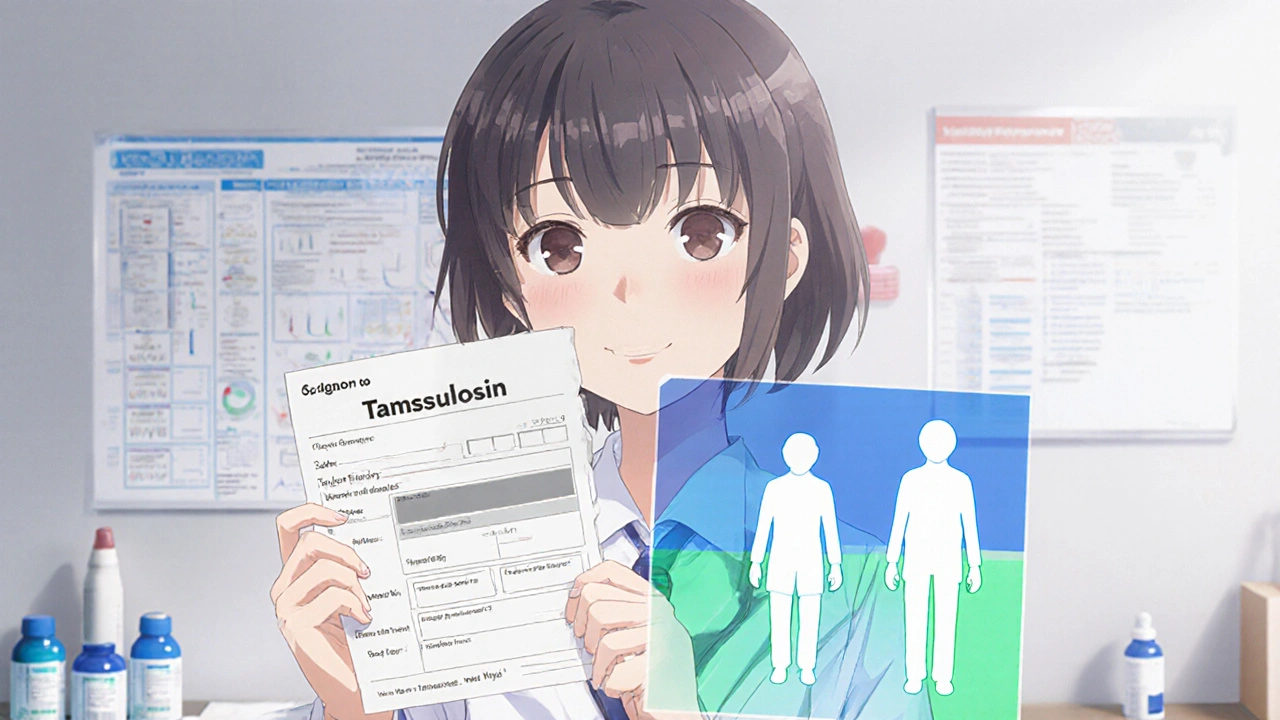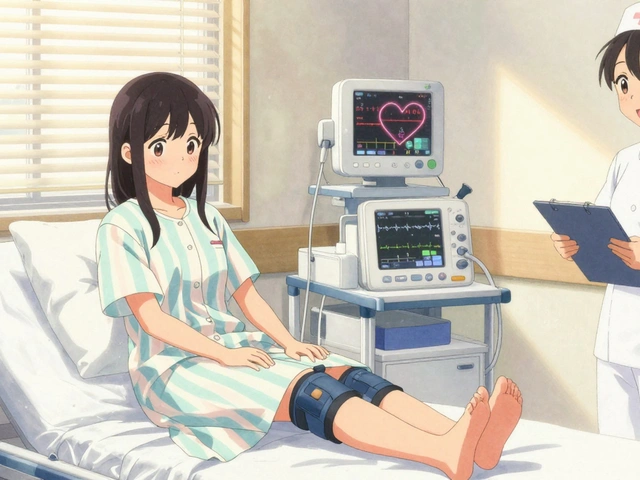
Hytrin (terazosin) has been used for decades to treat both high blood pressure and symptoms of an enlarged prostate (BPH). But it’s not the only option. If you’re on Hytrin and wondering if there’s a better fit - or if side effects are getting in the way - you’re not alone. Many people switch or compare alternatives based on effectiveness, cost, or how their body reacts. Let’s break down what Hytrin does, how it stacks up against other drugs, and what might work better for you.
What Hytrin (Terazosin) Actually Does
Hytrin is an alpha-1 blocker. It works by relaxing muscles in the prostate and bladder neck, which helps urine flow more easily. At the same time, it relaxes blood vessels, lowering blood pressure. That dual effect made it popular in the 1980s and 90s, especially for older men with both BPH and hypertension.
But here’s the catch: Hytrin has a steep side effect profile. Dizziness, especially when standing up, is common - up to 30% of users report it in clinical trials. Fatigue, headaches, and low blood pressure (orthostatic hypotension) are also frequent. Many patients stop taking it because of these effects. A 2021 study in the Journal of Urology found that nearly 40% of men discontinued terazosin within the first year due to tolerability issues.
Top Alternatives to Hytrin for BPH
If your main concern is urinary symptoms from an enlarged prostate, you have several better-tolerated options today.
- Tamsulosin (Flomax): This is the most common replacement. It’s also an alpha blocker, but it’s more selective - it targets prostate and bladder muscles without affecting blood vessels as much. That means less dizziness and fewer blood pressure drops. Most men tolerate tamsulosin well, and it works faster than Hytrin. A 2020 meta-analysis showed tamsulosin improved urine flow 20-30% more than terazosin with half the drop-out rate.
- Doxazosin (Cardura): Similar to Hytrin in structure and side effects. It’s not usually preferred unless cost is the biggest factor. Doxazosin still causes significant orthostatic hypotension, especially when starting. Many doctors avoid it as a first-line choice now.
- Alfuzosin (Uroxatral): Another selective alpha blocker. It’s taken once daily and has slightly lower dizziness rates than tamsulosin in some studies. It’s not as widely prescribed in the U.S., but it’s common in Europe and has strong data for symptom relief.
- Silodosin (Rapaflo): The most prostate-specific of all. It’s highly effective for urinary symptoms and causes almost no blood pressure drop. But it comes with its own trade-off: up to 20% of users report retrograde ejaculation (semen going backward into the bladder during orgasm). This isn’t harmful, but it can be distressing for some men.
Alternatives for High Blood Pressure
If your doctor prescribed Hytrin primarily for high blood pressure, not BPH, then your alternatives look very different. Alpha blockers like terazosin are no longer first-line for hypertension. Guidelines from the American Heart Association and the American College of Cardiology recommend other classes instead.
- ACE inhibitors (like lisinopril): These are often the go-to for patients with diabetes or kidney disease. They reduce protein in urine and protect kidney function.
- ARBs (like losartan): Similar to ACE inhibitors but with fewer cough-related side effects. Good alternative if you can’t tolerate ACE drugs.
- Calcium channel blockers (like amlodipine): Very effective at lowering blood pressure with minimal side effects. Often used in older adults.
- Thiazide diuretics (like hydrochlorothiazide): Cheap, proven, and effective. Often combined with other meds. Works best in people who retain fluid.
Hytrin is rarely used alone for hypertension today. If you’re on it for blood pressure, your doctor may be considering a switch - especially if you’re over 65 or have other health conditions.

Combination Therapies: When You Need More Than One Drug
Many men with moderate to severe BPH don’t get enough relief from a single alpha blocker. That’s where combination therapy comes in.
One common combo is tamsulosin + finasteride. Finasteride shrinks the prostate over time by blocking the hormone DHT. Studies show this combo reduces the risk of acute urinary retention by 50% compared to tamsulosin alone. It’s especially helpful for men with very large prostates (over 40 grams).
Another option is tamsulosin + mirabegron (Myrbetriq). Mirabegron relaxes the bladder muscle itself, helping with urgency and frequency. It’s often paired with alpha blockers when symptoms include both blockage and overactive bladder.
These combos aren’t replacements for Hytrin - they’re upgrades. They’re more effective and often better tolerated than older alpha blockers.
Cost and Accessibility: What’s Affordable Today?
Hytrin (terazosin) is available as a generic, and it’s cheap - often under $5 for a 30-day supply at Walmart or CVS. But price doesn’t always mean value.
Here’s how the alternatives stack up in cost (U.S. cash prices, 2025):
| Medication | Generic Name | Monthly Cost (Cash) | Common Side Effects | Best For |
|---|---|---|---|---|
| Hytrin | Terazosin | $4-$8 | Dizziness, low BP, fatigue | Low budget, if tolerated |
| Flomax | Tamsulosin | $10-$15 | Retrograde ejaculation, dizziness (less than Hytrin) | Most men - first-line choice |
| Rapaflo | Silodosin | $15-$25 | Retrograde ejaculation, diarrhea | Severe blockage, no BP concerns |
| Uroxatral | Alfuzosin | $12-$20 | Dizziness (mild), headache | Those who can’t take tamsulosin |
| Proscar | Finasteride | $10-$15 | Lower libido, erectile dysfunction (slow to work) | Large prostate, long-term use |
Insurance often covers tamsulosin and finasteride with low copays. Terazosin might be cheapest out-of-pocket, but if you’re dizzy and falling, it’s not worth the savings.
When to Stick With Hytrin
There are still cases where Hytrin makes sense:
- You’ve been on it for years with no side effects.
- You have both BPH and high blood pressure, and your current combo (e.g., terazosin + a diuretic) is working well.
- You’re on Medicare Part D and terazosin is the only covered option in your tier.
- You can’t afford newer meds and your doctor monitors you closely for drops in blood pressure.
But if you’re new to treatment, or if you’re struggling with dizziness, fatigue, or fainting - don’t just tough it out. Talk to your doctor. There are better options.

What to Ask Your Doctor
If you’re considering a switch, here are five questions to bring up:
- Is my main issue BPH symptoms, high blood pressure, or both?
- Are my side effects from Hytrin severe enough to warrant a change?
- Would tamsulosin or silodosin work better for my prostate size and symptoms?
- Should I consider adding finasteride if my prostate is large?
- Is there a cheaper generic alternative that’s just as safe?
Your doctor doesn’t need to push you toward the newest drug. But they should help you weigh effectiveness, side effects, and cost - not just keep you on what’s been prescribed for years.
Real-World Experience: What Patients Say
One 72-year-old man switched from Hytrin to tamsulosin after two falls in his bathroom. He said: "I didn’t realize how dizzy I was until it was gone. Now I can get up at night without holding onto the wall. And I haven’t dropped a single pill in my pants since."
A 68-year-old woman with high blood pressure and mild BPH was on Hytrin for five years. Her doctor switched her to lisinopril and tamsulosin. She said: "I was tired all the time on Hytrin. Now I have energy. My blood pressure is lower, and I don’t feel like I’m walking through molasses."
These aren’t rare stories. They’re common outcomes when people move away from older alpha blockers.
Is Hytrin still prescribed today?
Yes, but less often. Hytrin is still used, especially in older patients who tolerate it well or when cost is a major factor. However, most doctors now start with tamsulosin or other newer alpha blockers for BPH, and use different classes of drugs for high blood pressure. It’s no longer considered a first-line option.
Can I switch from Hytrin to tamsulosin on my own?
No. Never stop or switch blood pressure or prostate medications without your doctor’s guidance. Stopping Hytrin suddenly can cause a rebound increase in blood pressure. Switching requires a careful taper and monitoring, especially if you’re also on other meds. Your doctor will help you transition safely.
Do terazosin and tamsulosin work the same way?
They both block alpha-1 receptors, but differently. Terazosin affects receptors in blood vessels and the prostate, which is why it lowers blood pressure and causes dizziness. Tamsulosin targets only the prostate and bladder neck, so it helps with urination without major blood pressure drops. That’s why tamsulosin is safer for most people.
What’s the fastest way to improve BPH symptoms?
Tamsulosin works the fastest - most men notice improvement in urine flow within 1-2 weeks. Silodosin can work even quicker in some cases. Finasteride takes 3-6 months to shrink the prostate, so it’s not a quick fix. Combination therapy (tamsulosin + finasteride) gives both fast and long-term results.
Are there natural alternatives to Hytrin?
Saw palmetto and beta-sitosterol are sometimes used for mild BPH, but studies show they’re significantly less effective than prescription meds. The American Urological Association does not recommend them as primary treatment. If your symptoms are moderate to severe, stick with proven drugs. Natural doesn’t mean safer or better - especially when you’re at risk of urinary retention.
Next Steps: What to Do Now
If you’re on Hytrin and feeling dizzy, tired, or just not well - don’t ignore it. Schedule a talk with your doctor. Bring a list of your symptoms, how often they happen, and whether they’re affecting your daily life. Ask about switching to tamsulosin or another alternative.
If you’re not on Hytrin but have BPH or high blood pressure, ask your doctor why they chose your current medication. Is it because it’s the cheapest? Or because it’s the best fit for you?
Medication decisions shouldn’t be based on habit. They should be based on what works for your body - not your doctor’s old playbook.





Comments (15)
Ankita Sinha
Switched from Hytrin to tamsulosin last year after nearly hitting my head on the sink. Zero dizziness now. Nighttime pee runs like a faucet. My urologist said it’s the gold standard for a reason. No drama, just results.
Bette Rivas
While tamsulosin is indeed the first-line alpha blocker for BPH per AUA guidelines, it’s critical to consider prostate volume. For men with prostates over 40g, the combination of tamsulosin and finasteride reduces the risk of acute urinary retention by nearly 50% compared to monotherapy. This isn’t anecdotal-it’s backed by the MTOPS trial and subsequent meta-analyses. Cost shouldn’t override clinical outcomes when long-term morbidity is at stake.
Jessica Engelhardt
Hytrin is fine if you’re poor and don’t mind falling over. Tamsulosin? That’s the rich man’s drug. I’m on Medicare and they won’t cover it without a prior auth. So yeah I’ll keep my dizziness thanks. America’s healthcare system is a joke.
Tara Stelluti
Did you know terazosin was originally developed as a vasodilator for angina? They repurposed it for BPH because someone noticed old men stopped falling over after taking it. Now we have silodosin and it’s like they finally remembered the prostate isn’t a blood vessel. Pharma is just recycling old molecules with new labels.
Abdula'aziz Muhammad Nasir
In Nigeria, we rarely see terazosin due to cost and supply issues. Tamsulosin is the standard where available. Many patients come in with dizziness from old prescriptions. I always ask: Is this helping you live better or just keeping a prescription active? If it’s the latter, switch. Your quality of life matters more than brand loyalty.
Jeff Moeller
Medication isn’t about being right. It’s about being functional. If Hytrin keeps you upright and your BP stable, why change? The medical industry pushes new drugs like they’re the latest iPhone. But sometimes the old one still works. Don’t confuse innovation with improvement.
Paige Basford
My dad’s on Hytrin and he swears by it-he’s 78, no falls, BP under control. But I did some digging and found that the 2021 JURO study they cited? It excluded patients over 80. So if you’re older, the data doesn’t really apply. Always check the demographics before trusting a study. Just saying.
Brad Samuels
I’ve been on tamsulosin for 3 years. The retrograde ejaculation was awkward at first. But honestly? It’s not a health issue. It’s a social one. I stopped thinking about it after a month. The real win? Waking up without feeling like I’ve been hit by a truck. That’s worth a little weirdness.
Will Phillips
They’re hiding something. Why do all these new drugs have the same side effect? Retrograde ejaculation? Coincidence? Or is Big Pharma pushing drugs that ruin sex life so men stay on meds forever? I’m not taking anything new until I see the full FDA adverse event reports. No one’s asking the right questions.
Hannah Machiorlete
Hytrin made me feel like a zombie. I was so tired I canceled my granddaughter’s birthday. Switched to tamsulosin. Now I play with her. No more dizziness. No more guilt. I don’t care what the studies say. I care that I’m not a ghost anymore.
Arun Mohan
Let’s be real-most of these alternatives are just rebranded alpha blockers with a fancy label. The real breakthrough? Behavioral modifications. Fluid restriction after 6pm, pelvic floor exercises, avoiding caffeine. You think a pill fixes everything? That’s why we’re in this mess. We outsource our health to chemists.
darnell hunter
It is imperative to note that the pharmacokinetic profile of terazosin necessitates titration over a period of at least seven days to mitigate orthostatic hypotension. The assertion that tamsulosin is universally superior is not supported by randomized controlled trials in the geriatric population with comorbid orthostatic intolerance. Clinical judgment remains paramount.
Herbert Scheffknecht
What if the real problem isn’t the drug? What if it’s the idea that we need a drug at all? We treat symptoms like enemies. But maybe the body is trying to tell us something-slow down, hydrate, move, sleep. We medicate aging like a disease. Maybe the question isn’t which pill works better… but why we feel we need one at all.
Lauren Hale
My mom switched from Hytrin to tamsulosin after a near-fall. She’s 76. Now she walks the dog every morning. No dizziness. No fear. I told her: ‘Your body deserves better than a pill that makes you feel like you’re underwater.’ She cried. Then she hugged me. Sometimes the right choice isn’t the cheapest. It’s the one that lets you live.
Kenneth Meyer
If you’re still on Hytrin, ask yourself: am I taking this because it works… or because I’m afraid to change? Fear of the unknown is more dangerous than any side effect. The body adapts. So should your treatment.